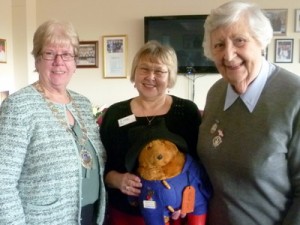Liz Archer, Archivist for Soroptimist International Great Britain and Ireland (SIGBI), was the guest speaker at SI South Lancashire’s Programme Action meeting in March.
The Federation’s archives are housed in Manchester. They include copies of ‘The British Soroptimist’ from 1930 (when there were seven UK clubs), press cuttings, photographs and, of course, the proceedings of the Federation itself.
Region and club records are not in SIGBI’s care. Therefore Liz urged everyone to keep minutes, annual accounts, reports and membership records. Printed paper copies are vital: as technology changes it becomes impossible to access old digital formats. Documents should be housed in a record office (or local history unit) – not in a member’s garage or attic!
Photos, too, have longevity in printed form, especially in monochrome, as colours degrade. It is essential to give details of dates, names, places, etc. – and not to store photos in sticky-back-plastic albums.
 Liz has compiled an ‘Archiving Guide for Regions’ which is downloadable from the Members’ Area of the SIGBI website.
Liz has compiled an ‘Archiving Guide for Regions’ which is downloadable from the Members’ Area of the SIGBI website.
Yvonne Mullen (SI Manchester) brought her club’s mascot, Paddington Bear, as an ‘honorary archive’. He attends meetings and, when appropriate, changes his outfit to suit the occasion. Regional President Margaret and Liz were delighted to meet him.
The afternoon’s Council meeting focused again on SI Manchester. Club members have devised a proposal, in partnership with local charity Act4Africa, which they wish to put forward for consideration as the next Federation-wide longterm project.
Martin Smedley (Chief Executive) explained that the charity is health and education centred. It aims to promote gender justice for women and girls, equip them with life skills to be free from poverty, and combat HIV.
The proposed Project HEAL (Health, Empowerment And Livelihood) would help girls and young women (15-30) in the Mchinji district, Malawi. Working directly with local partners, Act4Africa would concentrate on two themes: sexual/reproductive health and rights, and microfinance. The project would be scalable, according to funds raised; the cost per beneficiary being just £25.
After considering the proposal, club representatives voted overwhelmingly to support SI Manchester in the bid to become the next Federation project.

